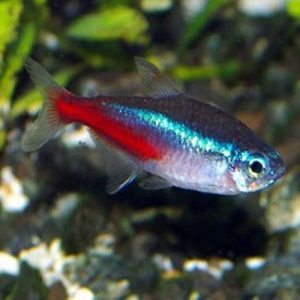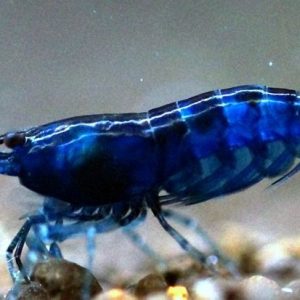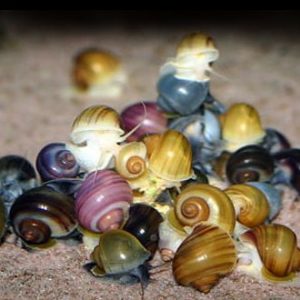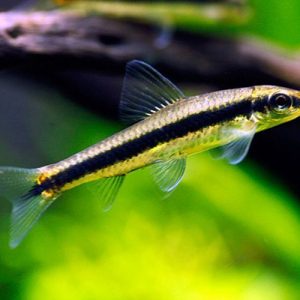Emperor Tetra
If you’re looking for an attractive addition to a community tank, the emperor tetra may be your ideal choice. Not only is it a handsome, iridescent species with impressive reflective rainbow hues, but it’s also a peaceful and hardy fish in a mixed community of South American freshwater fish. Emperor tetras are easy to find and relatively inexpensive.
| Family | Characidae |
|---|---|
| Origin | Colombia |
| Social | Peaceful |
| Tank Level | Mid dweller |
| Minimum Tank Size | 10 gallons |
| Diet | Omnivore, eats most foods |
| Breeding | Egg layer |
| Care | Intermediate |
| pH | 5.0 to 7.8 |
| Hardness | to 25 dGH |
| Temperature | 73 to 81 F (23 to 27 C) |
NOTE: Our live fishes are only delivered to Dubai, Sharjah, Ajman and Um Al Quaim.
Customers from Abudhabi and other Emirate may contact us to inquire about the live fish delivery schedule.
د.إ6.00
Beginning and Distribution
These fish are local to the freshwater Atrato and San Juan River bowls of Colombia in South America. They incessant regions that are sluggish, for example, little feeders and streams, where the temperature goes from 73 to 80 degrees Fahrenheit.
However the Emperor tetra is conveyed over a tight reach in the wild, it has turned into a most loved aquarium pet and is cultivated available to be purchased all over the planet. Starting at 2014, the IUCN Red List (International Union for Conservation of Nature and Natural Resources) has deficient information to decide the situation with this species right at home in the wild; more examination is required. In bondage, the species breeds promptly.
Shading and Markings
The alluring tinge and exquisite blades of the great sovereign tetra leave little uncertainty why the ruler tetra was given its name. Acquainted with home aquaria in 1960, it has become one of the more famous of the tetra group of fishes.
Balances of the two genders have a yellow shade and are edged in dark on the external fringe; they are red where the blade meets the body. The body of the fish is blue-dim with mauve tones, and it shows a practically brilliant sheen. A dim stripe runs on a level plane from head to tail, and the body is lighter in shading beneath the stripe.
Tankmates
A tutoring fish, the sovereign tetra does best in gatherings of five or six with a solitary alpha male, however it can flourish as a mated pair. It is additionally a tranquil animal categories, and in this manner ideal for a generally little local area tank however it will be upset by more disorderly species.
Some viable species incorporate danios, rasboras, different tetras, and serene catfish species like Corydoras or more modest Loricariids. Pencil fish and bantam cichlids are additionally great decisions, particularly as they hail from a similar general locale. You might need to pick species that balance outwardly with the vivid Emperor tetra to make a range that satisfies the eye.
Emeperor Tetra Habitat and Care
Emperors favor thick vegetation and stifled lighting that emulates the Colombian streams from which they start. Dim substrate and an intensely established tank will go far to cause them to feel at ease; these likewise give a lovely scenery to this current species’ splendid shadings.
In spite of the fact that peat filtration is suggested, they will flourish in even modestly hard water as long as it is changed as often as possible to keep up with virtue. These fish lean toward calm natural surroundings and ought to just be kept with other quiet species that share comparable water necessities.
Ruler Tetra Diet and Feeding
In the wild, the sovereign tetra takes care of fundamentally on worms and scavangers. Undemanding as far as their eating regimen, hostage sovereign tetras will promptly acknowledge drop food sources, freeze-dried food sources, and frozen food varieties. Live food varieties, for example, daphnia, mosquito hatchlings, and saline solution shrimp are particularly savored and are magnificent when molding reproducing sets.
Set aside Cash by Collecting Live Food For Your Fish
Sex Differences
Dissimilar to a large number of the tetra species that have a gender neutral appearance, male and female sovereign tetras are not difficult to separate. The dorsal and caudal balances of the male are observably longer and more pointed than the female. Additionally very recognizable in the male is a drawn out beam in the caudal balance that provides the tail with the presence of a harpoon. The female is likewise more modest and plumper in the body than the male.
Reproducing the Emperor Tetra
Schools made out of roughly equivalent quantities of guys and females will ultimately yield at least one rearing sets. Each reproducing pair ought to have their own rearing tank, as the guys become very forceful while producing. Separate the male and female from one another for a little while, and condition with live food varieties before generating endeavors.
Keep up with the water temperature in the rearing tank at 80 to 82 degrees Fahrenheit, with a pH of 7.0. The water ought to be extremely delicate. Place a bringing forth mop or some thick drifting plants in the tank, and keep the lighting stifled. The rearing tank need not be set up with a substrate or some other stylistic theme. This will take into account simplicity of cleaning as the fry (child fish) create.
Generating starts at sunrise; eggs are laid independently over a time of a few hours until fifty to one hundred eggs have been created. The guardians will regularly burn-through the eggs so the grown-ups ought to be eliminated in the wake of producing has finished. Utilize a wipe channel in the tank to forestall mischief to the fry as they are developing. Perform water changes week after week.
The fry will incubate in 24 to 48 hours and will eat infusoria or other little food varieties, for example, newly brought forth salt water shrimp. Water pH ought not be permitted to turn out to be excessively acidic, or the creating youthful might be lost as the consequence of stomach related unsettling influences.






